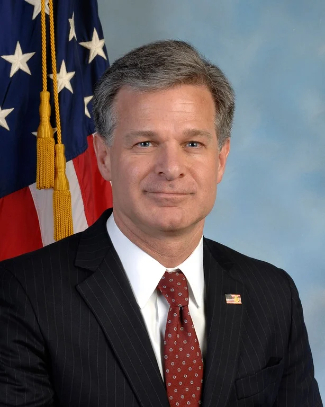
(photo courtesy of FBI.gov)
Christopher Wray, director of the Federal Bureau of Investigation, will deliver a featured keynote address at the third annual Vanderbilt University Summit on Modern Conflict and Emerging Threats, scheduled for April 17–18, 2024.
Since August 2017, Wray has served as the eighth director of the FBI, where he leads day-to-day operations of the intelligence-driven and threat-focused law enforcement and intelligence organization. The FBI is the principal investigative arm of the U.S. Department of Justice and a full member of the U.S. Intelligence Community. The bureau gathers, shares and analyzes intelligence, both to support its own investigations and those of its partners and to better understand and combat the security threats facing the United States.
“We are privileged to host Director Wray at Vanderbilt as part of our third Summit on Modern Conflict, and we welcome the deep insight and expertise in national security he brings,” Chancellor Daniel Diermeier said. “His participation in the summit will provide an exceptional opportunity to hear from one of the nation’s foremost authorities on the complexities of our security landscape, from threats by state actors to the need for cyber and infrastructure defense. Such expertise is key to building the collaborative and interdisciplinary approaches necessary for solving some of our nation’s most critical security challenges.”
The 2024 Vanderbilt Summit on Modern Conflict and Emerging Threats will bring together internationally recognized leaders in the military and intelligence communities to examine the subjects of cyber conflict, artificial intelligence, peer competition and emerging threats. The interdisciplinary gathering convenes experts in defense, intelligence, computer science, infrastructure engineering, political science, law, policy and human behavior with the goal of creating an approach that furthers understanding of and response to some of the most pressing issues our nation faces today.
Wray began his law enforcement career in 1997, serving in the Department of Justice as an assistant U.S. attorney for the Northern District of Georgia. In that role, he prosecuted a wide variety of federal criminal cases, including public corruption, gun trafficking, drug offenses and financial fraud. In 2001 he was named associate deputy attorney general, and then principal associate deputy attorney general, in the Office of the Deputy Attorney General in Washington, D.C. His duties there spanned the full DOJ, including responsibility for sensitive investigations conducted by the department’s law enforcement agencies.
Wray was nominated by President George W. Bush in 2003 to be the assistant attorney general for DOJ’s Criminal Division, supervising major national and international criminal investigations and prosecutions. He also oversaw the Counterterrorism Section and the Counterintelligence and Export Control Section, which were part of the Criminal Division throughout his tenure.
Wray was a member of the President’s Corporate Fraud Task Force, supervised the Enron Task Force, and served as a leader in DOJ’s post-9/11 efforts to combat terrorism, espionage and cybercrime with domestic and foreign government partners. At the conclusion of his tenure, he was awarded the Edmund J. Randolph Award, DOJ’s highest award for leadership and public service.
Born in New York City, Wray earned his bachelor’s degree from Yale University in 1989 and his J.D. from Yale Law School in 1992. He clerked for Judge J. Michael Luttig of the U.S. Court of Appeals for the 4th Circuit. In 1993, he joined the international law firm of King & Spalding LLP, where he spent a total of nearly 17 years practicing law in the areas of government investigations and white-collar crime. At the time of his nomination to be FBI director, Wray was chair of the firm’s Special Matters and Government Investigations Practice Group.
For more information about the Vanderbilt Summit on Modern Conflict and Emerging Threats, visit the summit’s website or email modernconflict@vanderbilt.edu.